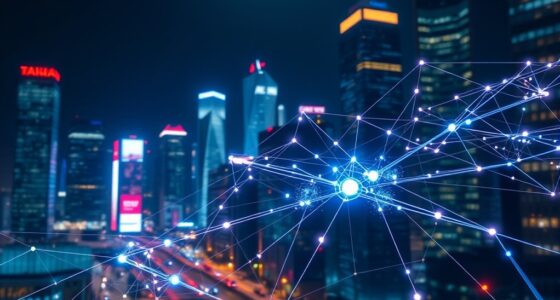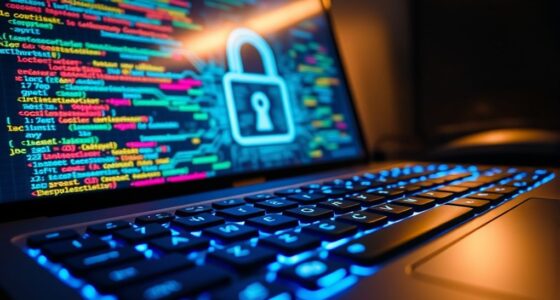A VPN, or Virtual Private Network, creates a secure, encrypted connection between your device and the internet. It protects your online activities from hackers, advertisers, and surveillance by hiding your IP address and encrypting your traffic. This allows you to browse privately, access restricted content, and prevent tracking on public Wi-Fi. If you want to learn how VPNs establish these protected links and the technology behind them, keep exploring.
Key Takeaways
- A VPN creates a secure, encrypted connection between your device and the internet, protecting your online data.
- It uses tunneling protocols to encapsulate and encrypt your traffic, ensuring privacy and security.
- VPNs mask your IP address and encrypt data, making your online activity anonymous and private.
- They enable access to geo-restricted content by routing your connection through servers in different locations.
- VPNs help prevent tracking on public Wi-Fi and safeguard your data from hackers and surveillance.
What Is a VPN and Why Do You Need One?
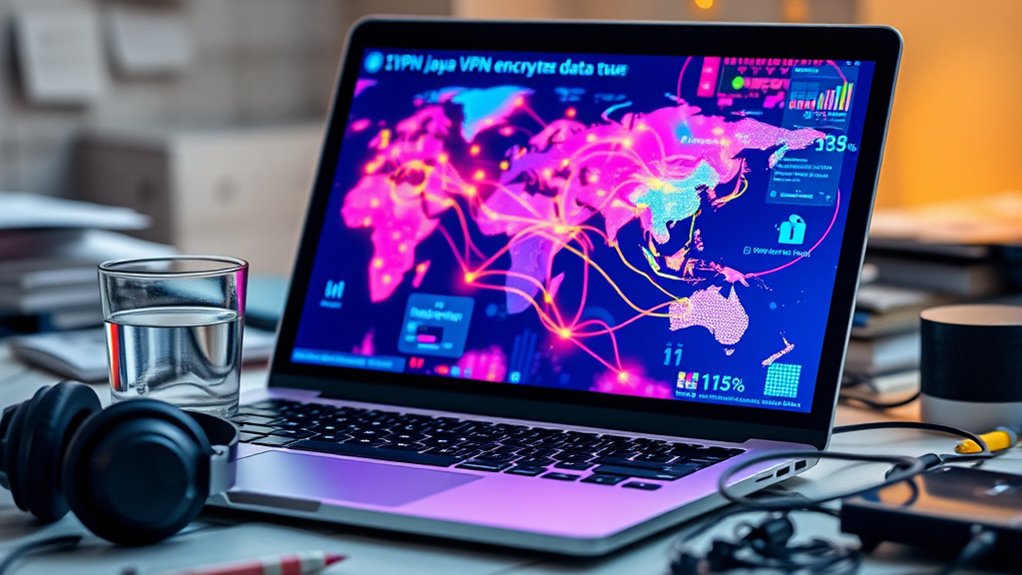
Have you ever wondered how to browse the internet more securely and privately? A VPN, or Virtual Private Network, is essential for protecting your online privacy and enhancing VPN security. It creates a secure, encrypted connection between your device and the internet, shielding your data from hackers and surveillance. Without a VPN, your online activities are vulnerable to tracking, especially on public Wi-Fi networks. By hiding your IP address and encrypting your traffic, a VPN helps you maintain anonymity and control over your personal information. Whether you’re streaming, shopping, or checking your email, a VPN ensures your digital footprint stays private. It’s a simple yet powerful tool to safeguard your online presence and prevent unauthorized access. Additionally, VPNs can incorporate predictive analytics to optimize connection speed and security features based on your usage patterns.
How Does a VPN Create a Secure Connection?

When you connect to a VPN, your data gets encrypted, making it unreadable to outsiders. Tunneling protocols then create a secure pathway through the internet, shielding your information from potential threats. These combined processes guarantee your online activity stays private and protected. Additionally, VPNs can offer access to geo-restricted content by masking your IP address, further enhancing your online experience.
Data Encryption Process
How does a VPN guarantee your data stays private and secure? It encrypts your data, transforming it into an unreadable format before transmission. This process uses advanced techniques like quantum encryption and hardware security modules to protect your information from hackers. When data travels through the VPN tunnel, only the recipient with the correct decryption key can access it. Here’s a quick look at key security elements:
| Security Feature | Function | Benefit |
|---|---|---|
| Quantum Encryption | Uses quantum principles for encryption | Unbreakable security |
| Hardware Security | Protects encryption devices | Prevents tampering |
| End-to-End Encryption | Secures data from source to destination | Maintains privacy |
| Secure Keys | Unique cryptographic keys | Ensures data integrity |
This layered approach guarantees your data remains safe from eavesdroppers.
Tunneling Protocols Used
Tunneling protocols are the backbone of a VPN’s secure connection, as they establish a protected pathway for your data to travel across the internet. These protocols determine how your data is encrypted and encapsulated, guaranteeing privacy and security. VPN encryption works alongside tunneling protocols to safeguard your information from hackers and eavesdroppers. Common tunneling protocols include OpenVPN, IKEv2/IPSec, and WireGuard, each offering different balances of speed and security. When you connect to a VPN, these protocols create a secure tunnel that prevents outsiders from viewing your online activity. Understanding tunneling protocols is essential for grasping how VPNs protect your data effectively. By choosing the right tunneling protocol, you ensure your VPN encryption effectively protects your data during transmission, maintaining your privacy and security across the internet.
The Technology Behind VPNs
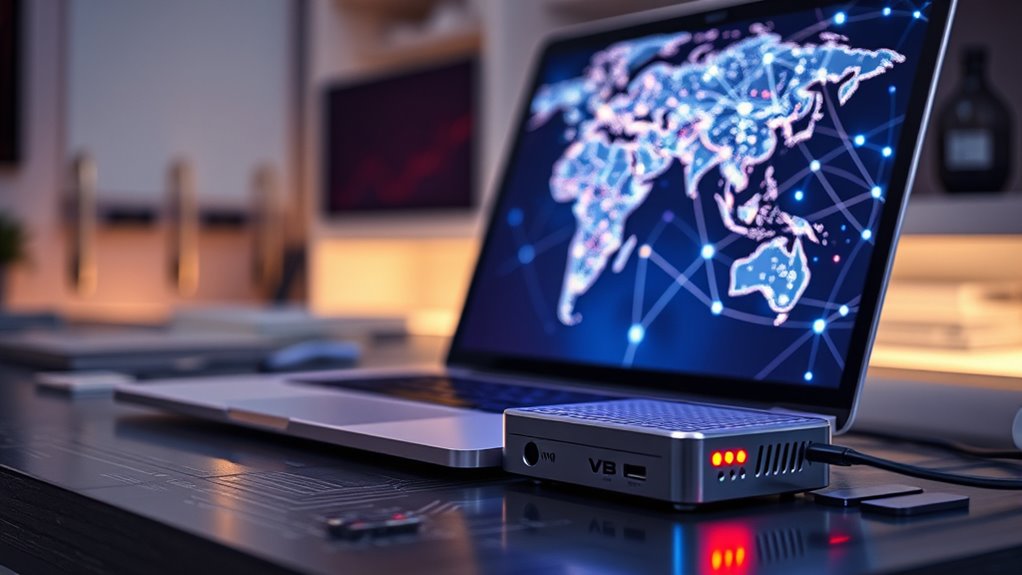
To understand how VPNs keep your data safe, you need to look at the encryption protocols they use. These protocols scramble your information so only authorized devices can read it. Additionally, tunneling methods create secure pathways, ensuring your data travels safely across the internet. Some VPNs also utilize advanced security features, such as multi-factor authentication, to further protect your information.
Encryption Protocols Explored
Encryption protocols are the backbone of a VPN’s security, guaranteeing that your data remains private and protected from prying eyes. Modern protocols often incorporate advanced techniques like quantum encryption, which leverages quantum mechanics to create virtually unbreakable security. This makes it extremely difficult for hackers to intercept or decode your information. Blockchain security also plays a role, providing a decentralized way to verify data integrity and prevent tampering. These protocols work behind the scenes to encrypt your data before it leaves your device, then decrypt it at the destination. By using robust encryption methods, VPNs safeguard your online activities, making it much harder for anyone to monitor or access your sensitive information. Both encryption techniques and ethical hacking are essential for understanding how vulnerabilities are identified and secured. This layered security helps ensure your privacy remains intact.
Tunneling Methods Explained
Understanding how VPNs create secure connections involves exploring tunneling methods, which are the essential technology behind the process. Tunneling techniques enable data to travel securely over the internet by encapsulating it within encrypted packets, preventing unauthorized access. Different tunneling protocols, like PPTP, L2TP/IPsec, and OpenVPN, use various encryption algorithms to protect your data during transit. These algorithms ensure that even if someone intercepts the data, they can’t decipher its contents. Each tunneling method offers a unique balance of speed and security, making it vital to choose the right one based on your needs. Additionally, the effectiveness of tunneling depends on the strength of the encryption, which is a critical aspect of VPN security****. Ultimately, tunneling techniques form the backbone of VPN security, safeguarding your online activities from prying eyes.
Types of VPNs and Their Uses

Have you ever wondered which type of VPN best suits your needs? There are different VPN types designed for various VPN uses. The most common are remote access VPNs, which let you connect securely to a private network from anywhere, ideal for remote workers. Site-to-site VPNs are used by organizations to connect multiple networks securely over the internet. There are also client-based VPNs, where you install software on your device for personal privacy, and browser VPNs, which only secure your browser activity. Each VPN type offers unique benefits depending on your needs—whether for secure remote work, protecting online privacy, or bypassing geo-restrictions. Understanding these VPN types helps you choose the right solution for your specific VPN uses. Additionally, some VPNs utilize encryption techniques to safeguard your data during transmission, ensuring your online activities remain private.
How VPNs Protect Your Privacy Online

When you use a VPN, it acts as a shield that helps safeguard your online privacy from potential threats. It encrypts your internet traffic using strong encryption algorithms, making it nearly impossible for hackers or third parties to see what you’re doing online. This encryption guarantees your data remains private even on unsecured networks. Additionally, VPNs hide your real IP address by routing your connection through servers located in different regions. Choosing different server locations allows you to mask your actual location, preventing websites and advertisers from tracking your activities. By combining robust encryption with strategic server placement, VPNs provide a powerful layer of privacy, giving you greater control over what information is exposed and helping you stay anonymous on the internet. Regularly updating your VPN settings enhances your security by ensuring you benefit from the latest privacy features and protections.
The Benefits of Using a VPN
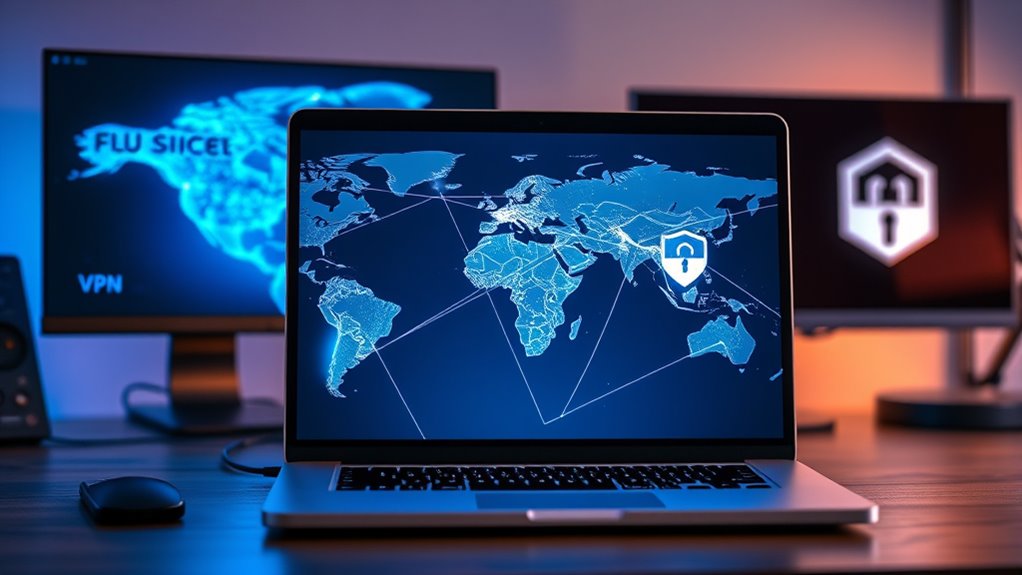
Using a VPN offers several key benefits that enhance your online experience and security. One major advantage is preventing bandwidth throttling, where your internet provider slows down your connection during high usage. A VPN masks your activity, helping you maintain consistent speeds. It also allows for geolocation masking, so you can access content restricted to specific regions, broadening your online options. Additionally, a VPN encrypts your data, protecting you from hackers and eavesdroppers. This added security ensures your personal information stays safe, especially on public Wi-Fi networks. By using a VPN, you gain more control over your online presence, enjoy faster and unrestricted browsing, and safeguard your privacy from intrusive monitoring. Understanding how projector technology impacts visual quality can further enhance your home entertainment setup.
Potential Limitations and Considerations

While VPNs offer numerous benefits, there are some limitations and considerations to keep in mind. One key issue is speed limitations; encrypting your data and routing it through remote servers can slow your internet connection, especially during high bandwidth activities. This can lead to noticeable lag or buffering when streaming or gaming. Additionally, connection stability varies depending on the VPN provider and server location, which may cause frequent disconnects or inconsistent performance. Some VPNs also have data caps or restrictions on free versions, limiting your usage. It’s important to choose a reliable provider to minimize these issues. Recognizing these potential limitations helps you set realistic expectations and ensures you select a VPN that best fits your needs. For example, Kia Tuning modifications often require careful adjustments, which can be affected by connection issues or bandwidth constraints.
Choosing the Right VPN Service
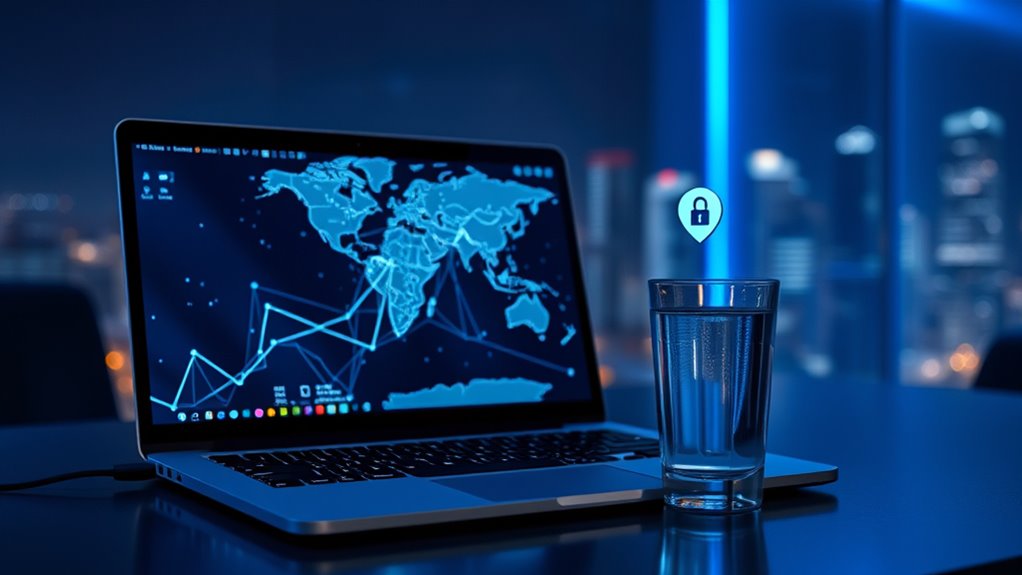
Choosing the right VPN service can substantially impact your online experience, so it’s essential to evaluate your needs carefully. Consider how the VPN handles user authentication to guarantee your data stays secure. Also, look into the VPN server network—more servers often mean better speed and access. Here are key factors to keep in mind:
- Security protocols and user authentication methods to protect your identity
- Number and location of VPN servers for ideal speed and access
- Logging policies to guarantee your activity remains private
A good VPN should offer strong encryption, reliable user authentication, and a wide server network. Taking these into account helps you select a service that balances security, performance, and privacy effectively.
Practical Tips for Using a VPN Effectively

To get the most out of your VPN, it’s important to follow some practical tips that enhance both security and performance. First, connect to a nearby VPN server to improve speed and reduce latency. This also helps with effective IP masking, making your online activities harder to trace. Avoid overloading a single server by switching between different locations when needed. Always enable the VPN’s security features, like kill switches, to prevent data leaks if the connection drops. Use strong, unique passwords for your VPN account and keep your software up to date. By carefully selecting your VPN server and leveraging IP masking, you ensure better privacy and a smoother browsing experience. These simple steps maximize your VPN’s benefits while maintaining safety.
Frequently Asked Questions
Can a VPN Slow Down My Internet Connection?
Yes, a VPN can slow down your internet connection sometimes. This happens because your data is encrypted through encryption protocols, which takes extra processing time. Additionally, if you’re connected to a distant server location, it can increase latency and reduce speed. However, choosing servers closer to your location and using faster encryption protocols can help minimize this slowdown, giving you a smoother browsing experience.
Are Free VPNS Safe to Use?
Free VPNs might seem tempting, but they come with risks. You could face free VPN risks like weaker VPN security, data leaks, or even malware. These services might sell your data or display intrusive ads, compromising your privacy. To stay safe online, it’s better to invest in a reputable paid VPN, which offers stronger security features, reliable connections, and peace of mind knowing your information stays protected.
How Does a VPN Affect Streaming Services?
Did you know that over 60% of streamers use VPNs to bypass geo restrictions? When you use a VPN, you can easily access content blocked in your region. However, it may slightly impact your streaming speed due to encryption and server distance. Overall, a VPN helps you bypass geo restrictions, but be aware it can sometimes cause buffering or slower streams depending on the server quality.
Is Using a VPN Legal in My Country?
You might wonder if using a VPN is legal in your country. The answer depends on local laws, as some countries have legal restrictions or government censorship that limit VPN use. You should check your country’s rules before using one, because in certain places, VPNs are banned or heavily regulated. Always stay informed about the legal landscape to avoid potential penalties or issues.
Can VPNS Protect Me From Malware and Viruses?
Sure, a VPN might seem like your digital superhero, but don’t rely on it for malware or viruses. While encryption protocols boost data privacy, they don’t scan for malicious files. So, if you want protection from malware, use dedicated antivirus software along with your VPN. Remember, a VPN encrypts your data, but it doesn’t turn your device into an immune fortress. Stay safe—combine tools wisely!
Conclusion
So, now that you know what a VPN is and how it keeps you safe, go ahead—embrace the digital fortress. Hide your browsing, dodge snoopers, and pretend you’re on a secret mission. Just remember, no tool is perfect—so don’t get too cocky. Keep your VPN updated, stay cautious, and enjoy the illusion of privacy. After all, in this digital age, a little mystery never hurt anyone—except maybe your internet provider.




